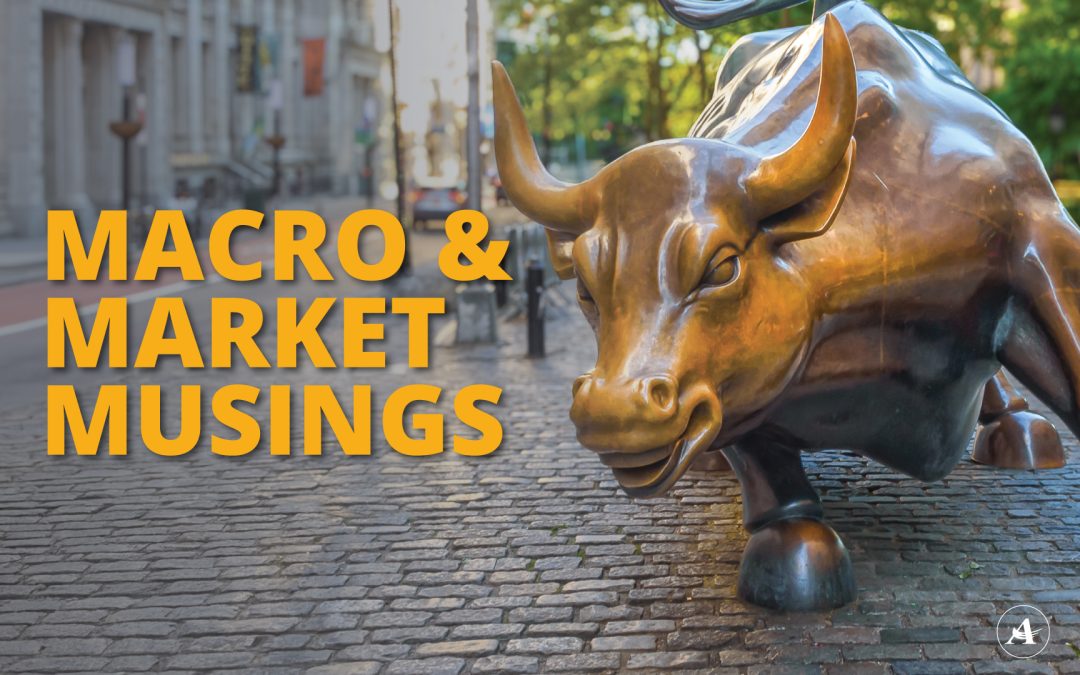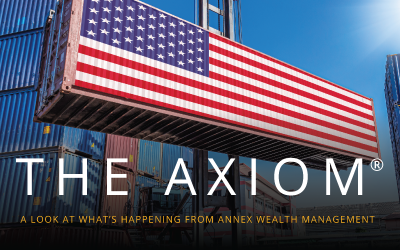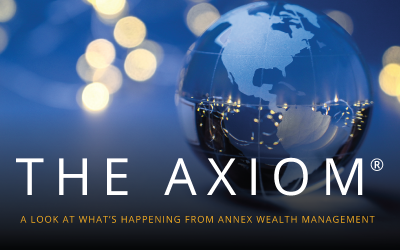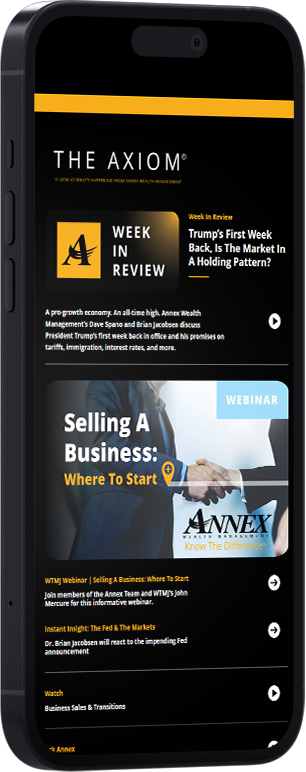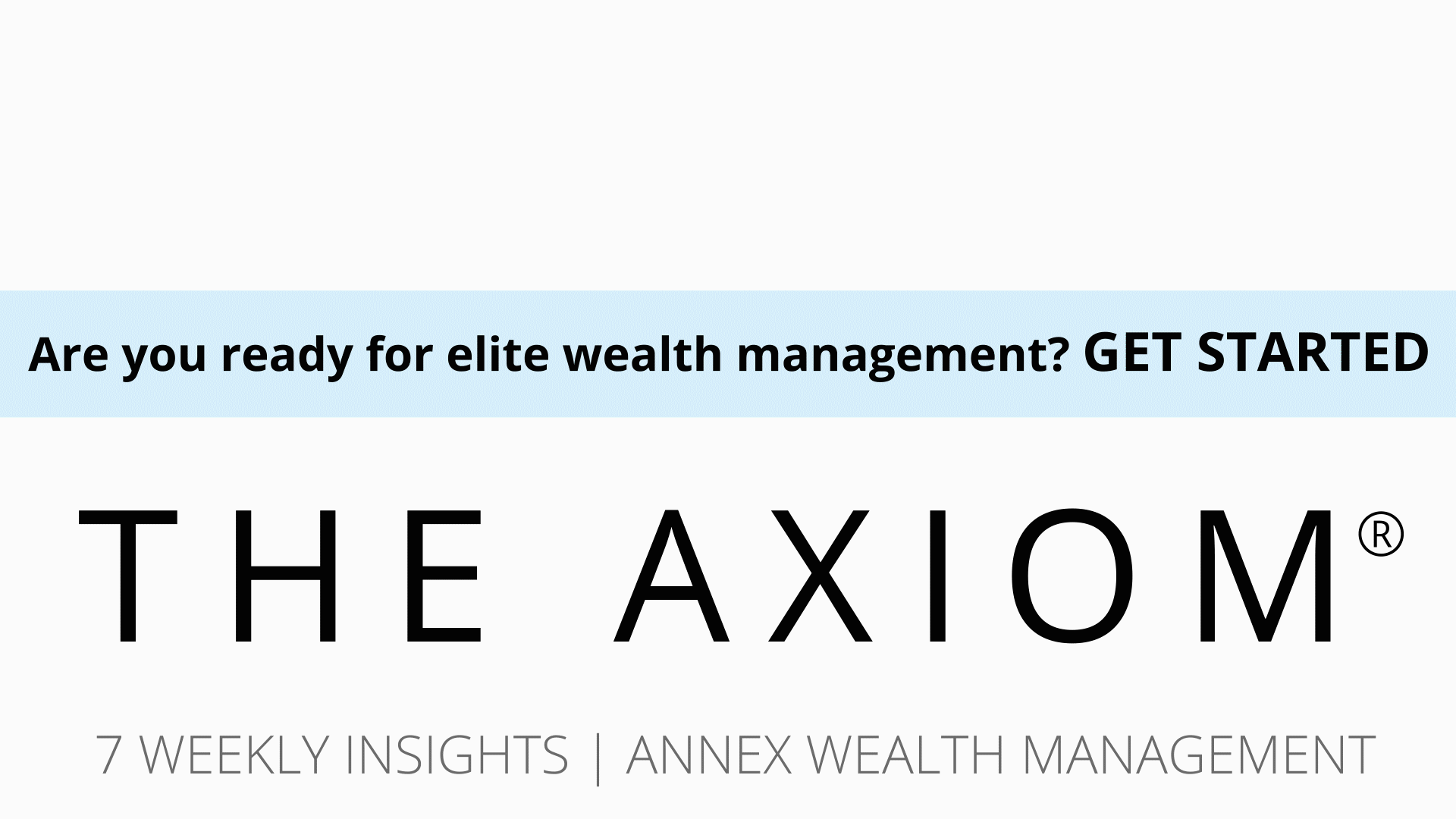
Axiom | Vol 252
Featured: Meet The Axiom’s Guest Editor: Deanne Phillips, CFP®, CDFA® | Inside: Economy Shows Continued Signs Of Strength – Are Buybacks Coming? | Poll Recap: Do You Think Bitcoin Is A Bubble? | MoneyDo: Know That You Own – International Equities | Ask Annex: What’s The Best Way To Gift My Son $60,000 For A House? | DYADT: Does Your Advisor Consider Your Financial Plan When Selling You Insurance? | Stimulus Checks Hit, Retail Sales Skyrocket | US Labor Department Reports Highest Consumer Price Jump Since 2018 | What’s An Expense Ratio?
Oops! We could not locate your form.

Meet The Axiom®’s Guest Editor: Deanne Phillips, CFP®, CDFA®
I’m Deanne Phillips – Director of Client Learning and Development at Annex Wealth Management.
I have a dual role at Annex: I get to work with the talented marketing team on production of content for webinars, educational events and radio segments as well as utilize my CFP® certification by sitting with clients as a wealth advisor, pulling the team of specialists needed to the table and assisting people with their financial planning.
As a Certified Divorce Financial Analyst and Accredited Behavioral Financial Professional, I get to work especially with people going through big financial transitions.
I am about to go through a big transition myself when my daughter heads off to the west coast for college! I look forward to continuing to spend my empty nester days teaching, working out, traveling, working as a master gardener around Milwaukee, and learning how to sail on our beautiful lake Michigan.
BACK TO TOP ↑

Economy Shows Continued Signs Of Strength – Are Buybacks Coming?
Real estate and unemployment posted promising figures, while banking reported positive earnings. Is the climate right for buybacks? Annex Wealth Management’s Dave Spano and Derek Felske discuss.
BACK TO TOP ↑

“I love the polls we do in the Axiom. As human beings, we all want to know what others think and are doing – and polling is a perfect way to both express our opinions and get an insight into others’ ideas and actions.”
– Guest Editor: Deanne Phillips, CFP®, CDFA® | Director of Client Learning & Development
________________________________________
Do You Think Bitcoin Is A Bubble?
With prices still soaring and a major public offering hitting the market, some investors see the leading cryptocurrency as just a bubble, while others argue the opposite.
According to our latest poll, a little over half of respondents, around 60%, believe Bitcoin is a bubble – while 28% disagree. 12% of respondents said they’re not quite sure what Bitcoin is.
So, what is Bitcoin?
There’s a lot to unpack when it comes to bitcoin but here’s the main points: bitcoin is a relatively new, digital currency (cryptocurrency) where transactions are made with no bank involvement. Because there’s no tie to a bank, bitcoin can be used to make purchases anonymously. The public can buy or sell bitcoins on “bitcoin exchanges” – online platforms like Coinbase, Bitstamp or Bitfinex(1).
It may seem like this futuristic payment system is only for a small, nerdy percentage of the population – however a growing number of e-commerce stores are accepting it. Bitcoin exchanges like Coinbase are partnering with huge platforms like Etsy and Shopify(2). The future of bitcoin, and cryptocurrency in general, is still very much in question. Proponents see limitless potential, while critics see nothing but risk.
1. https://money.cnn.com/infographic/technology/what-is-bitcoin/index.html
2. https://www.inc.com/amrita-khalid/cryptocurrency-bitcoin-payments.html
BACK TO TOP ↑

Know What You Own: International Equities
This week’s MoneyDo continues our advice to “Know What You Own,” specifically when it comes to International Equities.
As we mentioned in an earlier MoneyDo, while it sounds rudimentary, we find that many folks neglect to track what’s in their portfolio. Some haven’t looked in months or years. If you aren’t sure what you own, it’s time to heal your financial paralysis and start actively examining what you own – including your international equities position.
Living in the United States, it’s very easy to slip into a myopic view of investing and pursue only opportunities in US Markets. Part of the near-sightedness can be attributed to recency bias – we look at recent market history and see that the US has outperformed globally and believe this will continue to happen.
Beyond recency bias, many of us share a fundamental ignorance of corporations, geography, and the geopolitical pressures exerted on those markets.
This has only grown more important recently as the uncertainty around the global pandemic has largely grown the misconceptions around market performance in different countries.
Media doesn’t help: turn on cable business news, and you’ll likely watch for a significant period without an update on how markets are performing in Europe, or China, or South America. You likely can’t recall a written or on-air piece looking at investing in Africa. Still, a wise investor will fight through and explore international opportunities.
If you’re a DIY investor, getting started as an international investor can be daunting. You’ll discover that access to specific securities might be limited through your current investing portal. We’ve discovered that some brokerages have limitations, as well.
Make sure to ask the right questions as you choose international securities for your portfolio. Try to avoid bias – examine whether you’re picking opportunities that you know because they have a large US exposure. In addition, make sure you’re aware of rudimentary corporate information, like what countries the corporation is located in, and how stable the political environment is there. Take a long look at the currency used there, and their regional/geopolitical status, like whether or not they’re in the process of trying to exit a certain political block.
At Annex, our research seeks expert portfolio managers who have the ability to achieve higher risk-adjusted returns. To be a successful investor in the International markets, it could require being able to visit the companies you’re investing in, and becoming experts of the countries they are located in. Navigating the political risk, and understanding the local culture makes a tremendous impact in potential higher returns, and more importantly not taking unnecessary risk.
By knowing what you own and considering how it aligns with your financial plan, you can strive for more diversity and a balanced portfolio. If this MoneyDo is more work than you can handle, find an advisor you can trust to help you get started.
For help with international equities and/or a financial plan to help guide and inform your portfolio allocation, consider sitting down with us at Annex Wealth Management, where we perform an in-depth portfolio review to understand your current holdings.
BACK TO TOP ↑

This week’s Ask Annex comes from Susan, who asks:
“I would like to gift my son $60,000 to buy a house. I have over $100,000 in my checking and saving accounts. What is the best way to do this?”
___________________________
We asked Annex Wealth Management’s Ron Johnson, CFP®:
Thanks for contacting us. Congratulations on being able to consider helping your son out. You’re wise to ask about the best way to gift funds to your son. Part of the answer involves understanding the gift tax rules, so let’s start there.
The tax code allows each individual tax payer to gift up to $15,000 per recipient per year without filing a gift tax return. Therefore, if you’re married, you may give $15,000 to your son in 2021 and your spouse can also gift $15,000 for a total of $30,000. This is called the annual gift tax exclusion.
Now, fear not. If your gift exceeds $30,000 then, yes, a gift tax return should be filed. However, this doesn’t mean gift tax is due. In addition to the annual exclusion, the tax code provides a lifetime gift and estate tax exemption of $11.7 million per person. This means a married couple can gift up to $23.4 million during their lifetime in addition to the annual exclusion. Filing a gift tax return simply reports the amount given over the annual exclusion so the IRS can apply the gift to your lifetime exclusion. What this means in simple terms is yes, you can give $60,000 to your son and likely not owe any gift tax. You will just need to report the gift through the gift tax return. To avoid the additional paperwork, perhaps you can gift $30,000 this year and another $30,000 in January?
We hope this helps.
BACK TO TOP ↑

Does Your Financial Advisor Consider Your Financial Plan When Selling You Insurance?
How much life insurance do you need? The answer isn’t the same for everyone. Annex Wealth Management’s Senior Financial Planner, Ron Johnson, CFP® walks us through how to calculate a life insurance plan – and how working with an expert can help.
BACK TO TOP ↑


KNOW THE DIFFERENCE MINUTE:
Stimulus Checks Hit, Retail Sales Skyrocket
KNOW THE DIFFERENCE MINUTE:
US Labor Department Reports Highest Consumer Price Jump Since 2018
WHAT’S THAT?
What’s An Expense Ratio?
BACK TO TOP ↑

Annex Wealth Management provides free workshops, open to the public, on key wealth management topics.
Each week, we provide links to register for upcoming events.
BACK TO TOP ↑



